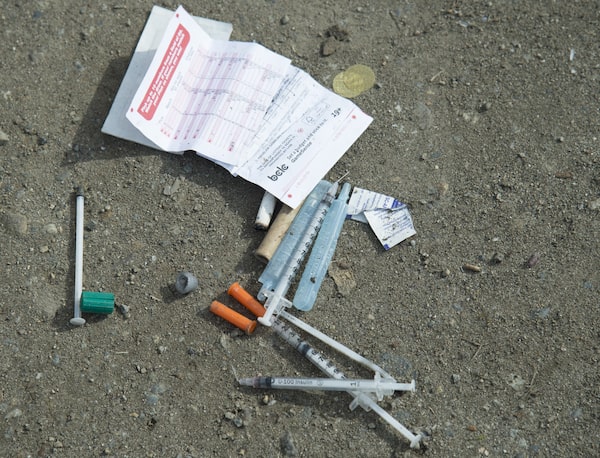
Needles on the ground in Oppenheimer Park in Vancouver's downtown eastside in March, 2020. Jennifer Whiteside, B.C.’s Minister for Mental Health and Addictions, is meeting Friday with her federal counterpart, Ya’ara Saks.JONATHAN HAYWARD/The Canadian Press
British Columbia is asking Ottawa to help the province rein in public drug use arising from its decriminalization pilot project, after its own attempt to establish limits through legislation were derailed by a B.C. Supreme Court injunction.
Jennifer Whiteside, B.C.’s Minister for Mental Health and Addictions, is meeting Friday with her federal counterpart Ya’ara Saks, where she’ll ask the federal Liberal government to review its current exemptions to the B.C. decriminalization pilot that limits drug use in some spaces.
“With respect to decrim, we’ll be having a conversation about how the exemptions are working to this point,” Ms. Whiteside said in an interview Thursday.
She also said she’ll be asking Ottawa for more support for supervised drug-consumption sites and other resources during Friday’s meeting in Vancouver.
Pressure is mounting on both governments to find ways to curb illicit drug use in spaces such as beaches, parks and hospitals. Since the province’s decriminalization experiment began on Jan. 31, 2023, adults in B.C. are not being arrested or charged for possessing small amounts of certain illegal drugs most commonly associated with overdoses. The trial required Ottawa’s approval, as it granted an exclusion from sections in the Criminal Code pertaining to drug use for a three-year period.
Ottawa has established some exceptions where illicit drug use is still prohibited, including at kindergarten to Grade 12 school premises, child-care facilities, airports, playgrounds and skate parks.
The province’s urban mayors say they are in crisis because of widespread public drug use. Senior police officials testified to a federal parliamentary committee last week that decriminalization went ahead without the necessary guardrails to keep public order. And hospital workers are reporting a marked increase in the use of illicit substances in patient rooms and bathrooms – even in the maternity unit of a large city hospital – which they say is putting workers and patients at risk.
Gary Mason: B.C.’s drug decriminalization project suffers another blow
The Decibel: A year of drug decriminalization in B.C.
Last November, the province sought to impose additional limits through the Restricting Public Consumption of Illegal Substances Act, which would allow police to fine or imprison people who refuse to comply with orders not to use drugs in certain outdoor locations such as parks and beaches. That law has been suspended by the B.C. Supreme Court while a Charter challenge by the Harm Reduction Nurses Association gets under way.
“We are looking at other options in light of the Supreme Court’s decision with respect to the injunction that prevents us from implementing that legislation, and that’s the conversation that we’re certainly having inside government, and that we’ll be having with the federal government,” Ms. Whiteside said.
While she did not elaborate on the options that are under consideration, the province’s avenues of recourse are strongly constrained by the courts. In his Dec. 29 injunction ruling, B.C. Supreme Court Chief Justice Christopher Hinkson wrote that the limits contained in the provincial legislation “will cause irreparable harm” by forcing drug use back into the shadows. Consumption of illicit drugs in the open is safer, he wrote, “given a dire lack of supervised consumption services, indoor locations to consume drugs, and housing.”
DJ Larkin, one of the lawyers representing the Harm Reduction Nurses Association, said in an interview that Ms. Whiteside has ignored their client’s invitation to negotiate an out-of-court settlement.
Mx. Larkin said the province’s legislation could be redrafted to assuage the concern that it will put drug users at greater risk. “It is so disappointing that the government is not investing in the solutions that we know will work. We’re one year into the decriminalization pilot. We have known this whole time that it needed to be coupled with more overdose prevention sites, proactive education, clear communications, and a continued commitment to helping to develop solutions to the unregulated drug supply. B.C. has not done that, and it’s devastating to see that there’s no offer on the table to resolve this legislation that is poorly drafted.”
Victoria Mayor Marianne Alto, a long-time champion of decriminalization, says communities are struggling to manage the fallout without the resources that should have been put in place from the start. “What’s happening now with decriminalization is a really great example of what happens when you only use one tool at a time,” she said in an interview. “What’s missing right now are the support services that allow people to take that extra step – services like rehabilitation and detox.”
Ms. Saks was not available for an interview, but in a statement provided by her office, said Ottawa is working with B.C. to ensure the pilot project is achieving its objectives. “We worked with B.C., at their request, on a decriminalization pilot project and continue to work closely with them on making sure that it’s working right. We have indicated from the outset that the B.C. exemption would be rigorously monitored and evaluated.”
Ms. Whiteside says it is too early to measure whether the pilot project is succeeding in its objective – to reduce deaths from a toxic, unregulated drug supply – and she indicated the province is not prepared to back down. “This is a very critical intervention we are making in the midst of an unprecedented public health emergency,” she said. “It’s a novel approach and we recognize it would take a considerable time to see the positive impacts.”